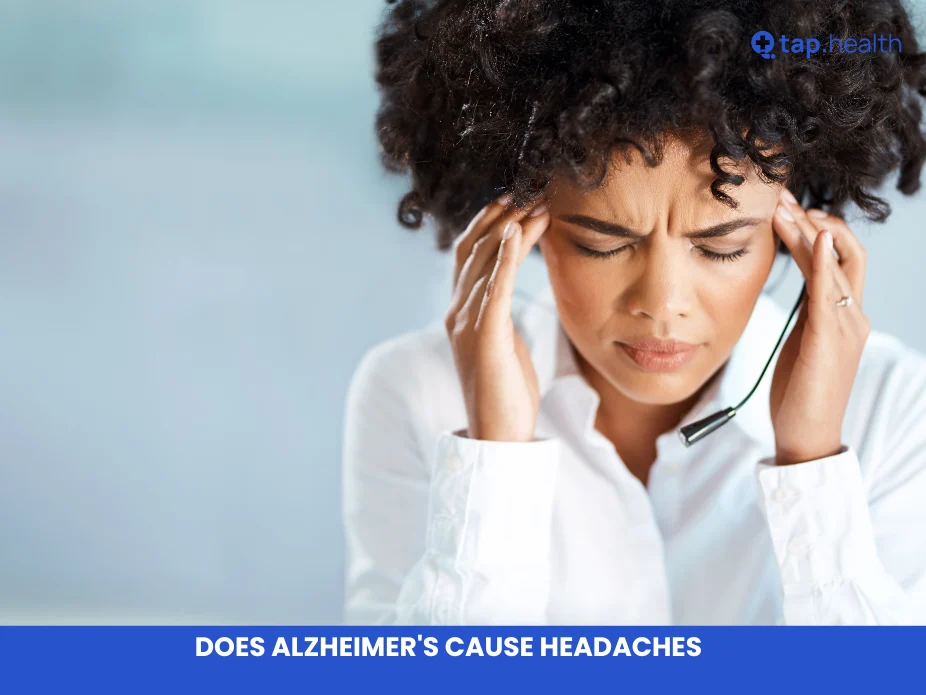No, headaches are not a core or direct symptom of Alzheimer’s disease. Alzheimer’s primarily affects memory, cognition, behavior, and daily functioning due to brain cell damage and neuroinflammation. However, many people with Alzheimer’s do experience frequent headaches because of indirect and associated factors.
Why Do Alzheimer’s Patients Often Get Headaches?
Several research-backed reasons explain the link between Alzheimer’s and headaches:
- Neuroinflammation in the brain can sometimes trigger headache-like sensations
- Medication side effects – Cholinesterase inhibitors (donepezil, rivastigmine, galantamine) commonly list headache as a side effect
- Dehydration – Memory issues make patients forget to drink enough water
- Coexisting conditions – Migraine history, high blood pressure, tension headaches, or vascular issues
- Stress and anxiety – Emotional changes in Alzheimer’s can worsen tension-type headaches or migraines
- Sleep disturbances – Common in Alzheimer’s and a known headache trigger
A 2016 study in the Journal of Alzheimer’s Disease confirmed neuroinflammation plays a role, while the American Academy of Neurology highlights that comorbidities increase headache risk in dementia patients.
Real-Life Experiences: Headaches in Alzheimer’s Patients
Ramesh, 70, from Mumbai, started having evening headaches after beginning donepezil. His neurologist adjusted the timing of the medicine and increased daily water intake – headaches reduced by 80% within weeks.
Anita, 65, from Chennai, had lifelong migraines. After her early-onset Alzheimer’s diagnosis, triggers became more frequent because of routine disruption and anxiety. Introducing a fixed daily schedule, short meditation sessions, and hydration reminders brought her migraines back under control.
Expert Insight on Alzheimer’s and Headache Connection
Dr. Neha Sharma, Neurologist, Delhi, explains: “Headaches are never a diagnostic symptom of Alzheimer’s, but they are common complaints. Patients often cannot verbalize pain properly, so caregivers must watch for indirect signs – restlessness, face rubbing, irritability, or withdrawal. Always investigate medication side effects and dehydration first.”
Evidence-Based Ways to Manage Headaches in Alzheimer’s
- Track patterns – Note time, food, hydration, and stress levels
- Ensure 8–10 glasses of water daily (use colored cups or timed reminders)
- Give medications with food or at different times if headaches follow dosing
- Create a calm, consistent routine to lower stress and anxiety
- Use gentle relaxation – soft music, hand massage, or guided breathing
- Rule out other causes – blood pressure, sinus issues, or eye strain
- Safe pain relief – Paracetamol is usually safest; avoid NSAIDs unless cleared by doctor
Frequently Asked Questions (People Also Ask)
Q: Is headache an early sign of Alzheimer’s?
A: No. Early signs are memory loss, word-finding difficulty, and disorientation.
Q: Which Alzheimer’s medications most commonly cause headaches?
A: Donepezil (Aricept), rivastigmine (Exelon), and sometimes memantine.
Q: Can lack of sleep in Alzheimer’s trigger headaches?
A: Yes, sleep disruption is a major headache and migraine trigger.
Q: Are migraines worse after Alzheimer’s diagnosis?
A: They can be, because stress, medication changes, and routine disruption lower the migraine threshold.
Q: When should caregivers worry about a headache in Alzheimer’s?
A: Sudden severe headache, vomiting, vision changes, or weakness – seek emergency care to rule out stroke or bleed.
Can Type 2 Diabetes Also Trigger Headaches in Alzheimer’s Patients?
Yes. Many Alzheimer’s patients have coexisting type 2 diabetes, and both high and low blood sugar levels are well-known headache triggers. Poorly controlled diabetes adds dehydration and inflammation, making headaches more frequent and harder to manage. Regular blood sugar monitoring, stable meals, and coordination between neurologist and diabetologist are essential.



